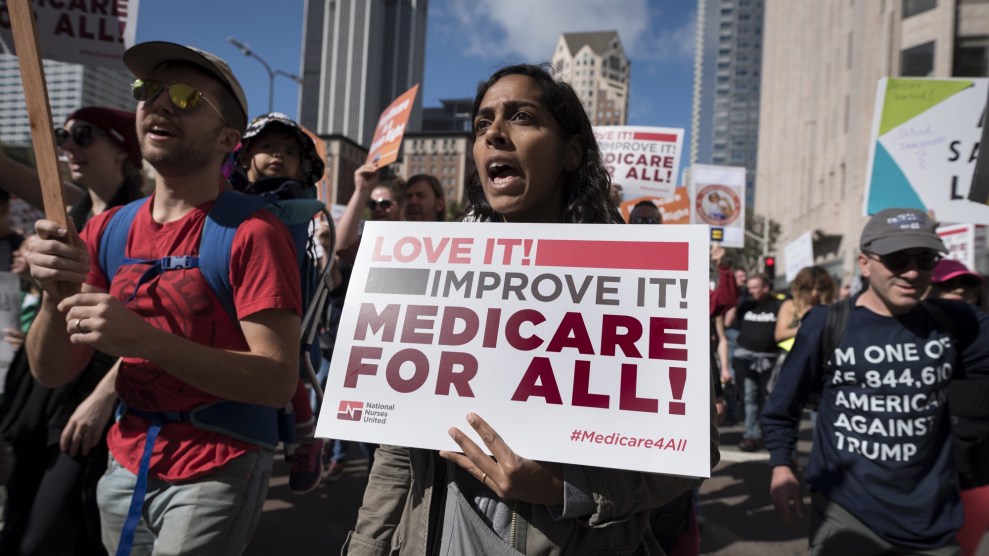
lucky-photographer/Getty
On a sweltering afternoon in a suburb of Los Angeles, in a strip mall shared by a Little Caesars and the Vallarta Supermarket, 80 people have come to protest their congressman’s vote for Trumpcare. They wear hospital gowns and neck braces or lean on canes and crutches as a mortuary dirge blares from a boom box. They hold RIP signs shaped like gravestones. Republican Rep. Steve Knight isn’t at his Simi Valley office, but a former staffer with a striking resemblance to Sarah Palin wades into the throng to speak on his behalf. Asked what she thinks of the Congressional Budget Office’s prediction that the most recent version of the bill would strip health care from 22 million Americans, she proclaims, “It was wrong in their numbers!”
“Oh, sure it was!” someone yells, and the crowd jeers the hapless surrogate offstage.
Over the next hour, a bullhorn is passed around by the protesters, many of them rookie activists who had never attended a political demonstration prior to the election of Donald Trump. They are associated with an ideological smorgasbord of lefty orgs—among them Code Pink, Indivisible, Democratic Socialists of America, Our Revolution, and the Simi Valley Democratic Club, which since November has seen attendance at its monthly meetings increase from a dozen people to 85 or so. Some of the protesters are here to plug single-payer health care. Others want an “end to all US wars and militarism.” But they all seem to agree on one thing: “We can’t let this end with rallies outside Steve Knight’s office when he is not here,” Jon Cummings, co-founder of the 600-member Indivisible Conejo, says to cheers. “Keep going! We have to get these people out of office!”
California, among the bluest of blue states, remains home to 14 Republican districts that are becoming increasingly vulnerable, thanks in part to an influx of Latino immigrants and college-educated voters. Knight’s is one of seven districts that went for Hillary Clinton over Trump last year. According to polls released by the Democratic Congressional Campaign Committee this month, voters now favor Democrats over Republicans by significant margins in four of the districts—including this one—and are evenly split in two more. So it behooves the party, which needs 24 seats to retake the House in 2018, to start in its own backyard. The committee is already targeting the seats held by Reps. Devin Nunes and Jeff Denham, who face significant ethics challenges. “Almost a third of those seats can be won in the Golden State,” says California congressman and DCCC vice chair Ted Lieu.
In light of the stakes, the campaign committee is moving its Western regional office from Washington, DC, to Orange County—which until last year hadn’t voted for a Democratic president since Franklin Delano Roosevelt. The committee’s new Western region director, Kyle Layman, is best known for leading Rep. Raul Ruiz’s 2012 ouster of Republican Mary Bono Mack in Riverside County. Beyond commissioning the slick TV ads and mailers that typify the national party’s “air support” for its candidates, Layman aims to deploy a weapon unique to Democrats: an army of grassroots anti-Trump activists who are dying to hit the streets. “The main goal right now is to make sure we keep the energy up,” says Lieu, who represents liberal Malibu, Santa Monica, and Rancho Palos Verdes. “If the election were held tomorrow, I am confident we would flip the House.”
Not everyone shares his optimism. “On the face of it, these are not easy districts for Democrats to win,” says Darry Sragow, a veteran Democratic strategist who publishes the California Target Book, a data-focused guide to political campaigns. Five of the seven GOP districts that backed Clinton have not voted for any other statewide Democrats in the last three elections. Flipping them in November “depends on mobilizing a lot of people who might not normally vote,” Sragow says, which means “there has got to be energy at the grassroots level” to knock on doors and register new voters. But bruising primary races between the party’s warring factions could leave it sapped. “That is one of a whole bunch of very serious risks that the Democrats have to wrestle with,” he says.

9 House Districts California Dems Are Trying to Flip
Simmering beneath the anti-Trump fervor are animosities between the party’s centrists and progressives, who view the DCCC as a tool of deep-pocketed donors and Washington politicos. Nowhere are the tensions more acute than in Knight’s district, where the committee intervened in last year’s primary, backing Bryan Caforio, a wealthy LA attorney who had just moved into the district, against Lou Vince, a local policeman supported by the grassroots. Vince was so mad about his party’s meddling that he ended up endorsing Knight—who beat Caforio with 53 percent of the vote. “I would never be able to describe the DCCC as a force for good in any way, shape, or form,” says Los Angeles blogger Howie Klein, whose Blue America political action committee supports progressive candidates. The national party’s candidate recruiters, Klein adds, are “threatened by progressives.”
Dissatisfaction with the national party has run deep here since 2010, when the Democrats lost the House. Eight years in the minority hasn’t helped matters. After Democrats picked up a paltry six congressional seats last November—despite Clinton’s 2.8 million-vote margin over Trump—then-House Minority Leader Nancy Pelosi agreed to a series of reforms. Henceforth, the DCCC chair would be elected by the Democratic caucus instead of being appointed by the party’s congressional leader—in addition, Democratic members of Congress would elect five regional vice chairs, a new position. “I wasn’t particularly happy with the performance last term of the DCCC,” Lieu says of his decision to run for one of those posts. “I thought rather than complain, I should go try and do something about it.”
If anybody can unite California Democrats, it is probably Lieu, an immigrant from Taiwan and a colonel in the Air Force Reserves whose Twitter account has gone from 10,000 to 300,000 followers since January on the strength of his acerbic trolling of Trump. A few examples…
Mr. President: If there was a wiretap at Trump Tower, that means a fed judge found probable cause of crime which means you are in deep shit. https://t.co/i7dUMtHXmo
— Ted Lieu (@tedlieu) March 4, 2017
Colluding with comrade @ChelseaHandler over coffee in Santa Monica. pic.twitter.com/CJZZvYYFGq
— Ted Lieu (@tedlieu) April 17, 2017
Dear @POTUS: You should also investigate who disclosed location of nuclear subs & leaked classified info to Russians. Oh wait, that was you. https://t.co/qyBYf50XR3
— Ted Lieu (@tedlieu) May 25, 2017
Lieu’s tweets have enamored him to those who say Trump and the Russians stole the election, but he’s also a member of the Congressional Progressive Caucus who believes Clinton’s campaign was fatally flawed. “Not having a compelling message was a problem,” Lieu says. “Now, we know Trump is a super bad person, but I still think we need something beyond that. We need to say, ‘Yes, Trump is a super bad person, and this is what Democrats stand for—this is what we are going to do.’ We are not going to make that mistake again.”
I meet up with Lieu one afternoon at a leafy outdoor café in the University Park neighborhood of Los Angeles. His measured, soft-spoken demeanor stands in contrast to his snarky social-media personality. A few days earlier, the DCCC had been widely mocked for a set of proposed bumper sticker slogans, including: “Democrats 2018: I mean, have you seen the other guys?” “That’s probably not going to be the winner,” Lieu quips. He prefers bolder progressive slogans such as “Healthcare for All,” but Lieu, who was among a small handful of elected officials to endorse cop-candidate Lou Vince in Knight’s district, really doesn’t think he—or anyone at the DCCC—should predetermine the party’s message or tip the scales in local races during primary season. “My view is that we should let people in that district choose,” he says, “No matter how awesome I think I am or the people at the DCCC are, there’s no way the DCCC can be aware of 435 congressional districts in the same way that the people who live there are aware.”
Lieu’s own career reflects a disdain for paint-by-numbers politics. During his first race for Congress, in 2014, he aired an unconventional campaign ad criticizing the National Security Agency for “spying on Americans.” “It probably wouldn’t have polled very well,” he told me, “but I felt very strongly about it.” He says he has also followed his convictions by taking a hawkish stance in support of Israel and opposing the Iran nuclear deal, which has upset some progressive supporters while appealing to others in his heavily Jewish congressional district. (In 2014, a political action committee supported by Las Vegas casino magnate Sheldon Adelson had sent out an attack mailer attempting to tie Lieu to the Palestinian terrorist group Hamas).
In any case, his willingness to criticize the DCCC is highly unusual. The committee is notoriously opaque and resistant to publicity. Spokeswoman Meredith Kelly wouldn’t let me interview Layman, the new Western director, even after Lieu’s chief of staff pleaded my case. (She could not “start making exceptions,” Kelly said, to a rule banning some staffers from talking to the press.) Lieu himself has been more active than other vice chairs in the committee’s affairs, publicly stating, for instance, that if the party’s consultants and pollsters “don’t meet standards, they will be released”—a stance that has intrigued DCCC critics. “I totally believe in Ted,” Klein says. “I think he can achieve a lot.”
Even so, Lieu’s ties to the DCCC put him at odds with those in the base who oppose big money in politics and aim to reinstate an Obama-era ban on donations from lobbyists and corporate PACs. Contributions to the committee in 2016 included a combined $1 million from investment firms Soros Fund Management, Saban Capital Group, and Renaissance Technologies, according to OpenSecrets.org. Such relationships don’t sit easy with Lieu, who as a state legislator co-authored a successful advisory measure asking voters whether they wanted to overturn the Supreme Court’s Citizens United ruling—perhaps via a constitutional amendment. But “until that is done,” he says, “I think it is not a prudent idea to unilaterally disarm. It just makes it that much harder to run in these races…The Democrats almost always get outspent.”
Whatever Lieu does to try to mend relations in the coming months, the national party will be hard-pressed to bring restive California Democrats into the fold. After we leave the café, I follow the congressman to a church on the University of Southern California campus, where he’s scheduled to speak at a packed and sweaty event, which is part of the DNC Resistance Summer effort. The plan is to inspire Democratic activists with speeches and then run a phone bank against Trumpcare—boilerplate stuff. But some of the attendees have their own agenda. As Democratic National Committee deputy Chair Keith Ellison (D-Minn.) rises to introduce Lieu, he is heckled loudly by chants of “single-payer now!”—a reference to a state health care bill that was recently tabled by the speaker of the California Assembly. “I believe in single-payer,” Ellison interjects, but the hecklers, mostly men and women in their 20s, are neither placated nor dissuaded by scattered shouts from their elders of “That’s so rude!” and “Sit down!”
The heckling would grow more intense during a speech by the state party’s chair, Eric Bauman, who narrowly defeated a candidate backed by Bernie Sanders supporters in May. Bauman looked like he was about to throw up as a fifth of the crowd stormed out after his speech to hold a counter-rally. A gaggle of nervous cops gathered in the doorway. The phone banking was pretty much a bust.
But before Bauman, when Lieu spoke, most of the hecklers had listened respectfully. “I want to say to those folks who support single-payer now, I am with you,” Lieu said, drawing a huge cheer. He mentioned a single-payer bill he’d co-authored as a state legislator—and his support for a similar bill in Congress. “I want to make this happen at the national level,” he said. With the crowd now paying rapt attention, Lieu pointed out that he’d have a much easier time making universal health care a reality if Democrats could retake Congress. There are 23 Republican congressional districts across the nation that voted for Clinton, he told the activists. “Seven of those are in California,” he said with a twinkle in his eye. “We are going to flip them in November—with your help.”












